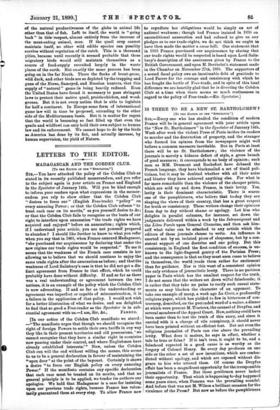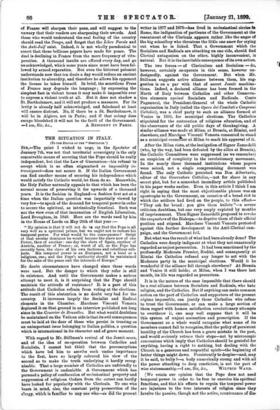IS THERE TO BE A NEW ST. BARTHOLOMEW P
[To THE EDITOR OP THZ "SPECTATOR.']
Sin,—Every one who has studied the condition of modern France will be in general agreement with your article upon the "New St. Bartholomew" in the Spectator of January 14th. Week after week the violent Press of Paris incites its readers to murder and the destruction of property, and the stranger who formed his opinion from the newspapers might well believe a common massacre inevitable. But in Paris at least there will be no St. Bartholomew ; the violence of the journals is merely a hideous defect of style, a gross breach of good manners; it corresponds to no body of opinion ; such men as MM. Drumont and Rochefort have debased the French language, they have blackmailed a set of timid poli- ticians, but it may be doubted whether with all their noise and bluster they have achieved anything else. For what is far more remarkable than the violence of the cheaper prints, which are sold up and down France, is their levity. Yes, levity is their dominant characteristic. There is scarce one of the pamphleteers, who believe that to-day they are shaping the views of their country, that has a great respect for truth or consistency. These writers change their opinions from day to day without shame or apology. Let him who delights in parallel columns, for instance, set down the judgments delivered within a week by the Intransigeant and the Libre Parole upon General Chanoine, and then ask him- self what value can be attached to any article which the editors of these journals choose to write. An influence is exerted not by an isolated piece of eloquence, but by a con- sistent support of one doctrine and one policy. But this consistency, in England the first condition of anemia, is un- known to the light-fingered gentry of the Parisian Press ; and the consequence is that as they must soon cease to believe in themselves, the world ',reads them rather for excitement than for guidance. Nor is this want of a consistent opinion the only evidence of journalistic levity. There is no partisan paper in Paris which has the smallest respect for the truth. I do not mean that the writers set down wilful falsehoods; it is rather that they take no pains to verify such casual state- ments as may blacken the character of an opponent. To take one example of many, a week ago La Croix, a professedly religious paper, which has yielded to few in bitterness of con- troversy, described, on the pretended word of a waiter, a dinner at which were present M. Trarieux, the counsel of Dreyfus, and several members of the Appeal Court. Now, nothing could have been easier than to test the truth of this story, and since it carried with it a charge of vile conspiracy, it should never have been printed without an efficient test. But not even the religious journalist of Paris can rise above the prevailing levity. What does it matter, he says in effect, whether a tale be true or false P If it isn't true, it ought to be, and a falsehood repeated in a good cause is as worthy as the forgery of Colonel Henry. So every day produces on one side or the other a set of new inventions, which are contra- dicted without apology, and which are exposed without dis- grace to him who uttered them. Of coarse the Dreyfus affair has been a magnificent opportunity for the irresponsible journalists of France. Bat these gentlemen never lacked their opportunity. That which is happening to-day happened some years since, when Panama was the prevailing scandal. And before that was not M. Wilson a brilliant occasion for the virulence of the Press? But now as before the pamphleteers
of Franoe will sharpen their pens, and will suggest to the unwary that their readers are sharpening their swords. And those who would understand the real feeling of the country should read the Temps, and forget that the Libre Parole and the Anti-Juif exist. Indeed, it is not wholly paradoxical to assert that these bellicose papers have made for peace. The duel is declining in France from the mere frequency of vitu- peration. A thousand insults are offered every day, and go unacknowledged, which some years since must have been fol- lowed by armed reparation. But even the bitterest polemist understands now that ten duels a day would reduce an ancient institution to absurdity, and therefore he allows his opponent the license he takes himself. In brief, the scurrilous Press of France may degrade the language ; by expressing the simplest fact in violent terms it may make it impossible ever to express a violent truth at all. But it does not shadow a St. Bartholomew, and it will not produce a massacre. For its levity is already half acknowledged, and falsehood at least will ensure distrust. No, if there be a St. Bartholomew, it will be in Algiers, not in Paris ; and if that colony does escape bloodshed it will not be the fault of the Government.



































 Previous page
Previous page